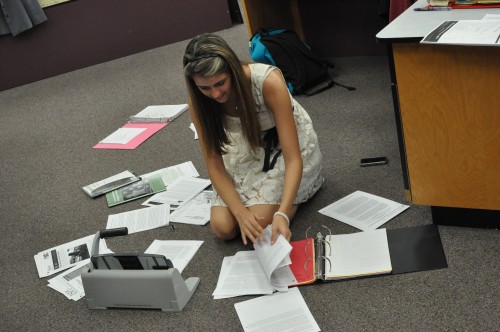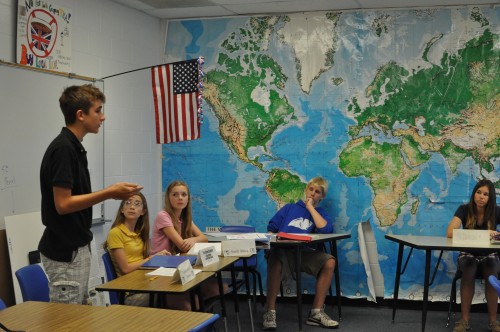This article is part of a series that investigates the different high school circuits. We previously featured the West Coast and Puerto Rico. This one focuses on Southwest Florida. An upcoming article will focus on a sub-set of the Midwest.
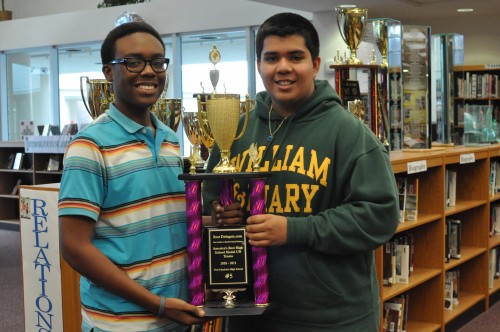
Southwest Florida high schools are very proud of their Model UN accomplishments. Port Charlotte students hold up a trophy their principal gave them for being ranked in Best Delegate's Top 25 high school rankings here.
In our geographical analysis of the high school Model UN circuit, we noticed two Sun Belt metropolitan areas that were significantly overrepresented in the Model UN activity relative to the population of their metro area. The first was San Antonio which produces most of the best teams in Texas and is home to a high school-run conference, MUNSA, that is the largest conference in Texas. The second was the Cape Coral-Fort Myers-Naples metropolitan area — essentially Southwest Florida. Southwest Florida high schools are more nationally recognized because their teams tend to travel out-of-state and win at conferences around the country. You may recognize some of the names: Port Charlotte, Gulf Coast, Canterbury, and Cape Coral.
It got us to wonder: what are the driving factors that have enabled a metropolitan area of less than 1 million people to produce as many top teams as New York, Los Angeles, or Chicago? We were so curious that we made a special trip to speak with the high schools in the area. I learned that all of these programs have different philosophies, cultures, and training methods, but they all lead to similar results: high quality delegates at conferences, valuable life lessons learned, and fierce pride in their respective program. Here’s an insider’s perspective on how the cycle of success looks like.
We interviewed four nationally prominent schools to get a better understanding of the Southwest Florida Model UN circuit. I caught Port Charlotte, Gulf Coast, and Canterbury during their normal club meetings to get an inside perspective of their club. I was able to speak with Cape Coral briefly while I was at BosMUN. The one school that I missed due to scheduling difficulties was the Pine View School. Here are the profiles for the four schools that I interviewed:
- Port Charlotte High School. They are perennially a national top-5 team and have won at the most competitive conferences on the circuit such as Harvard HMUN and Georgetown NAIMUN. Their advisors are Bob Johnson and Debbie Monk.
- Cape Coral High School. They are an established program and have won at large conferences such as Boston University BosMUN and George Washington WAMUNC. They also host the SMUNC conference. Their advisors are Michael Cook and Harriet Mottaz.
- Gulf Coast High School. They are a newer program that has already won at conferences such as Columbia CMUNCE and UCLA BruinMUN. Their advisors are Susan Soulard and Marsha Lane.
- Canterbury School. They are also a newer program but have already won small delegation awards at the most competitive conferences such as Harvard HMUN and Georgetown NAIMUN. Their advisor is Evan Crawford.
Below are the thematic takeaways that I wanted to share and it all falls into a cycle. The learning process starts off with the lessons teachers emphasize to their students. The students then put in a lot of hard work in training, practice, and preparation. This leads to a lot of success at conferences and the teams are very proud of their accomplishments. The success has also enabled the delegates to get into top colleges. All this gets the next generation of students to be excited to join Model UN, and the process repeats itself. The culture of success is sustainable.
1. The teachers emphasize valuable life lessons, and this influences each students’ leadership style.
The biggest question that teachers always face is: What Should Model UN Teach? There are plenty of valuable lessons but I asked each teacher to share what they emphasized the most to their students. The answers ranged from character qualities such as professionalism and perseverance to every-day approaches to life such as having fun while learning and being able to compromise. These qualities are instilled in the students and influence the leadership style they will take when they get into committee. Although all the schools are competitive, the emphasis is not on winning awards and multiple advisors mentioned that. It’s also notable that the teachers did not make many MUN references to learning about international issues or learning specific skills like public speaking and negotiation or if they did, it’s in context of teaching a larger lesson. That tells me that they are focused on more on how their students do Model UN than on what they do specifically — it’s about the journey, not the destination.
Watch the video below to see the full responses from the faculty advisors of all four teams:
Part of the reason why the schools in Southwest Florida produce excellent delegates is that they spend time on both the hard skills (e.g. knowledge, policy, solutions) as well as the soft skills (e.g. public speaking, teamwork, negotiation).
Port Charlotte probably spends one of the highest number of hours out of any club program in the nation with four hour sessions on Tuesdays and two hour sessions on Thursdays. Their sessions primarily focus on research and having students share expertise on specific topics, but students will also pair up to practice speeches and run grill sessions on their topics (similar to “roasts” ran by Mira Costa).
Gulf Coast practices after school and I happened to drop by while they were focusing on impromptu public speaking. Specifically, the exercise that they ran was to help students form concise policy statements (i.e. picking a side from a “Would You Rather..?” question), work on transition words between major ideas within a speech, and eliminate filler words (e.g. “um”). The feedback is immediate. Notice how the teachers point out where they can make transitions and notice how the students raise their hands up to flag someone down whenever they’re using a filler word. Here are some examples of those speeches as well as the feedback provided by their advisors below. You’ll also notice that Gulf Coast likes to be more humorous during their practice sessions to keep it fun.
There is a lot of pride in each of the Model UN teams and there are tangible examples to demonstrate that at each school. Port Charlotte has more trophies than can be fit in one room, but it also displays many news clippings about the team’s success. Furthermore, their principal gave them a special trophy after they were ranked on Best Delegate’s top 25 high school rankings last year. The sign outside of Canterbury School had also mentioned Canterbury’s top 25 high school ranking for many weeks before it was replaced with another Model UN achievement after the team came back from Georgetown where they won Outstanding Small Delegation. Both schools also get to use the best room at their school — Port Charlotte even has their own Model UN room (video tour below).
As an outside observer, I suspect that pride is a characteristic typical of the state of Florida because I see the same amount of pride at the college level, too. College Model UN teams like Florida, Florida State, and Miami are also incredibly proud of their accomplishments and make it known to the circuit.
The display of pride leads to better recognition by administrators, fellow students, media outlets, and the community at large. This helps the team recruit more students and gain more respect and administration support, although it doesn’t necessarily translate to more financial support at the school-district level. Nevertheless, it helps elevate the prestige and level of visibility Model UN has to the school and community, and that’s beneficial for the teams.
Unfortunately, Model UN is still not unanimously valued in Florida and the teams do face some challenges. Model UN is occasionally attacked by political conservatives in the South. Despite the successes of the teams, they sometimes still struggle to gain support and recognition from the school districts and some local media. And regardless, Model UN will always be second at best in terms of funding and support to the king of all Southern extracurricular activities: football.

Port Charlotte students hold up a trophy that their principal gave them for being ranked on Best Delegate's Top 25 High School Rankings
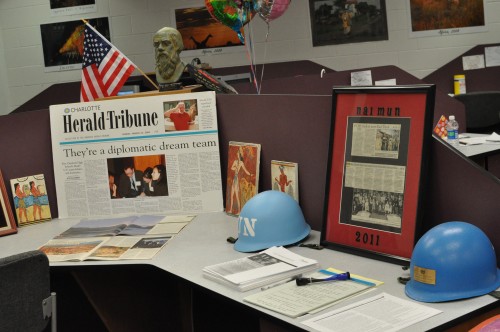
Port Charlotte has many news clippings and trophies on display in their Model UN room and the school library. This section contains the UN Helmet trophies from McGill SSUNS.
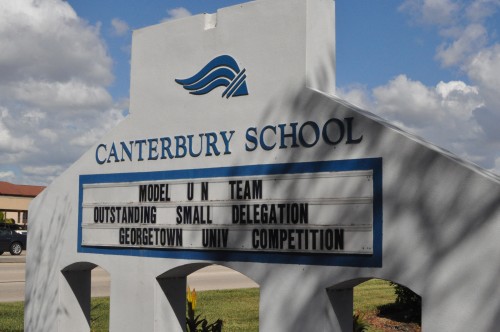
Canterbury School is very proud of its Model UN program. Prior to the display mentioning the NAIMUN win, it had mentioned the team being ranked on BestDelegate.com.
On a related note, check out Port Charlotte’s Model UN room! I thought Mission Viejo High School and Edison High School in Southern California had cool Model UN rooms, but this one is much bigger with both communal space and individual kiosks! Best Delegate intern Amanda Piazza gives us a tour:
One of the funnier theories on why Model UN is so popular in Southwest Florida offered by students from several schools was that there’s nothing to do in Southwest Florida! They want to get out of the state and visit other parts of the USA. But I also noticed from speaking with the students, with locals, and with even seeing a bunch of Boston Red Sox fans in town for baseball spring training that a lot of the people who live in Southwest Florida had moved in from the Northeast and Midwest during the Florida housing boom. There’s a lot of family and cultural connections with those areas — areas where Model UN, academic competitions, and getting into top colleges take precedence over football — and I think that has something to do with why students want to attend conferences in those areas.
But wanting to attend Model UN conferences in the Northeast only gets a team so far. It needs to demonstrate value and a successful track record to these parents who had migrated from the academically-inclined Northeast and Midwest. Any number of activities can be beneficial for the students, but what’s going to help get their kids into colleges — colleges that value students with diverse world views and leadership skills? It’s Model UN, of course.
This point is further reinforced by their local conference, Southwest Florida MUN (SWFLMUN) hosted at Florida Gulf Coast University by the Naples Council on World Affairs, where thousands of dollars of college scholarships are given every year to graduating seniors based on cumulative performance at that conference over the years. Needless to say, the monetary incentive makes SWFLMUN one of the most competitive regional conferences in the nation.
Model UN has helped the students in the local area get into college, whether that’s the popular in-state universities (e.g. Florida and Florida State) or an out-of-state school. I interviewed two students to share their insights. Samantha from Port Charlotte High School will be attending Harvard University and Samantha from Canterbury School will be attending the United States Naval Academy. Here’s what they had to say about how Model UN helped them get into college:
Given all their success in committee, the team pride and recognition, and even the track record of using MUN to get into college, many students are interested in joining the teams. When I dropped by Canterbury, I noticed that their Director of Training was running a simulation for the middle school students (the middle school and high school are on the same campus). Students learned parliamentary procedure and were able to debate about North Korea during the mock session. At Port Charlotte, I noticed several eighth graders from different schools in the area volunteered to come be part of their Tuesday research session. They got a few tips from a more experienced delegate and then went off to do their own individual research just like all the other Port Charlotte delegates that were preparing for their next conference. Gulf Coast has a relatively young team in terms of grade levels, but they were already making an impact on campus and getting more students to become interested in joining.
Success begets success. People want to be part of a successful organization, and organizations that open themselves up to others and embrace the next generation of young leaders will be sustainably excellent for many years to come.
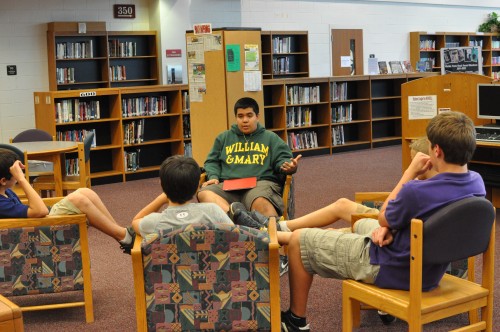

Eighth graders volunteered to take part in Port Charlotte's after school practice sessions. They get a few pointers from a more experienced delegate here.
**
Despite having fewer than 1 million residents in the metropolitan area, Southwest Florida high schools have figured out a formula that works for them and allowed them to be disproportionately represented in the national Model UN circuit. That formula starts off with an emphasis on life lessons. The teams then put in hard work during practice and preparation. That leads to stellar results which is proudly displayed, and a side effect is that their MUN accomplishments helped their students get into college. Finally, younger students see this and want to be part of it, and the cycle sustainably repeats itself.
Southwest Florida’s rise is only beginning. For many years, Port Charlotte has been and still is the dominant program in Florida and the South. The teams in the local area would always lose to Port Charlotte but they weren’t sure exactly how good they were. It’s only recently that all the other teams started traveling — they figured that if Port Charlotte could do it, why couldn’t we? As Cape Coral, Canterbury, and Gulf Coast traveled to the East Coast and beyond, I think they might have even surprised themselves when they were able to capture delegation awards against much more seasoned teams. They were already national powerhouses but just didn’t realize it in their smaller pond in Florida. As they continue to be exposed more frequently outside of Florida and gain more experience, it should be inevitable that these teams will improve and become even better than they currently are.
What else should the circuit know about high school teams in Southwest Florida?

